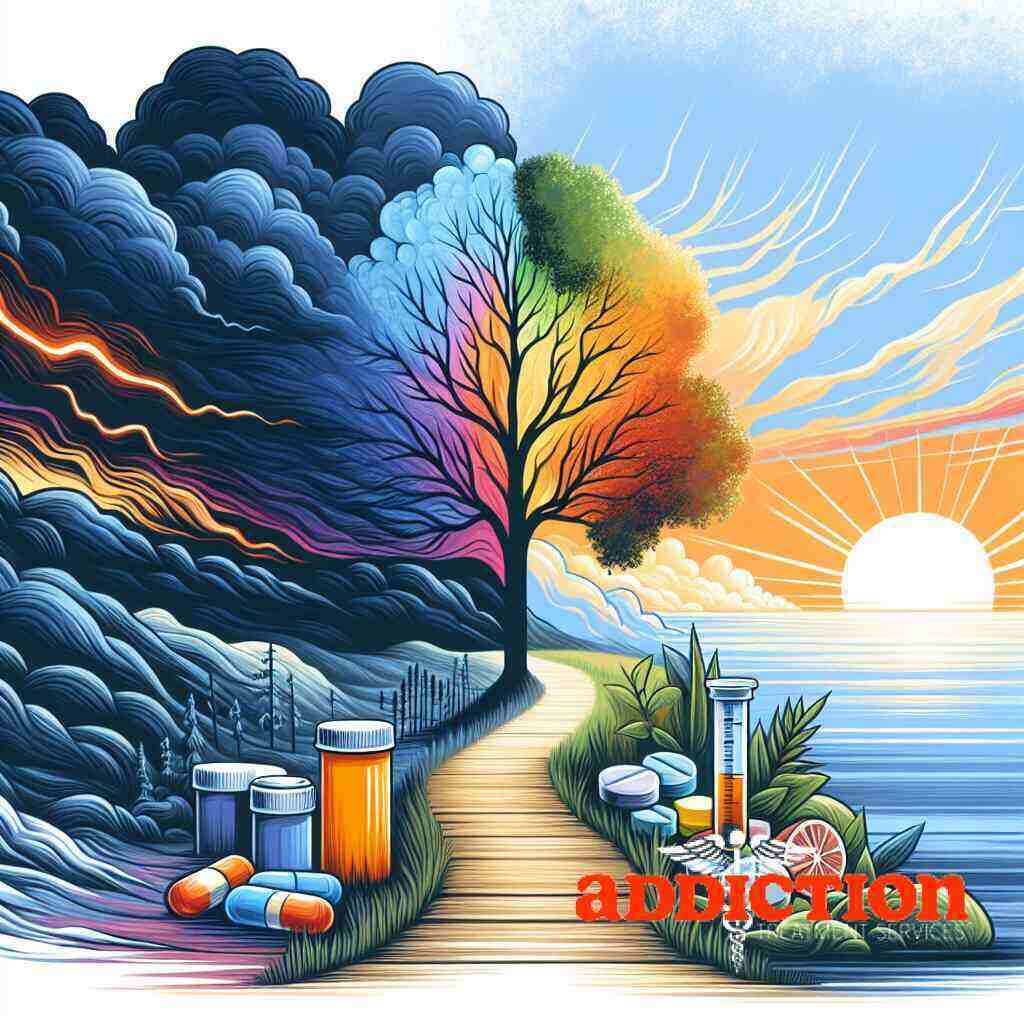 Posted On: 06/21/2024
Posted On: 06/21/2024Understanding Methadone and Its Role in Addiction Treatment
What is Methadone
Methadone is a synthetic opioid used for several decades to treat opioid addiction and manage pain. Unlike other opioids, methadone’s unique properties allow it to prevent withdrawal symptoms in people trying to recover from opioid addiction without producing the high associated with drug abuse. It’s a critical component in the toolbox of addiction treatment services, aiming to provide individuals suffering from substance use disorders a chance at a stable recovery. Methadone can be administered in a controlled manner, making it an effective medication for long-term maintenance therapy.
The Science Behind Methadone Treatment
Methadone works by occupying the brain’s opioid receptors, where it then stabilizes the brain’s chemistry without eliciting the euphoria opioids usually provide. This significantly reduces cravings and alleviates withdrawal symptoms. Methadone’s efficacy lies in its ability to provide a controlled, steady state of dopamine release, helping to restore balance to the areas of the brain affected by addiction. The long half-life of methadone, typically 24 to 36 hours, means it can be taken once daily, which helps those in recovery maintain a more stable life without the constant need for drug-seeking behavior. This stabilization is crucial for individuals’ adherence to the recovery process and their ability to engage in other forms of treatment, such as behavioral health services or psychotherapy.
The Place of Methadone in Medication-Assisted Treatment (MAT)
Methadone is a cornerstone of Medication-Assisted Treatment (MAT), a holistic approach to opioid addiction treatment that combines medications with counseling and behavioral therapies. MAT recognizes that medication can play a crucial role in the initial stabilization phase of recovery, allowing patients to engage more effectively in psychotherapy and other recovery activities. Methadone, as part of this comprehensive care model, enables individuals to overcome the physical hurdles of addiction, thus facilitating a smoother transition into long-term recovery and the management of substance use disorders. With MAT, the goal is to treat the whole person, acknowledging that addiction is a complex, multifaceted disorder that requires a comprehensive, integrative approach for effective management and recovery.
By incorporating medication assistance in recovery, individuals are given the tools necessary to step down from their dependence on opioids in a manner that’s manageable and less likely to cause significant discomfort or precipitate a relapse, making methadone an invaluable resource in the fight against opioid addiction.
The Impact of Methadone on Opioid Addiction
Reducing Drug Cravings and Managing Withdrawal Symptoms
Methadone treatment plays a pivotal role in managing symptoms of opiate withdrawal, offering a beacon of hope for individuals battling the grip of opioid addiction. By effectively reducing drug cravings and easing the painful withdrawal symptoms, methadone enables individuals to transition more smoothly from a state of dependency to one of recovery. The process of withdrawal can be daunting,symptoms such as nausea, anxiety, insomnia, and agitation can often lead to relapse. Methadone’s ability to alleviate these symptoms without producing the euphoric high associated with opioids makes it a game-changer in addiction treatment. This medication assists patients in maintaining physical and psychological stability, allowing them to focus on their recovery journey with a clearer mind.
Methadone’s role extends beyond mere symptom management,it helps rewire the brain’s chemistry gradually. By mimicking the effects of opioids at a much lower, controlled level, it helps reduce cravings, a critical factor in preventing relapse. This facilitates a smoother recovery process, enabling individuals to participate actively in behavioral therapies and support groups, essential components of a comprehensive addiction treatment plan. The integration of methadone treatment with supportive counseling and educational programs for substance misuse significantly enhances the likelihood of successful long-term recovery.
Methadone Maintenance Therapy: A Path toward Recovery
Methadone Maintenance Therapy (MMT) offers a structured, clinically supervised pathway for those recovering from opioid addiction. As a long-term treatment solution, MMT provides a stable foundation from which individuals can rebuild their lives. The consistent use of methadone under medical supervision helps patients regain a sense of normalcy, often lost during periods of active addiction. This stability is crucial for encouraging engagement in productive activities such as employment, education, and healthy social interactions, which are vital for recovery and reintegration into society.
MMT isn’t a quick fix but rather a step toward re-establishing balance in an individual’s life. The therapy is customized to each person’s needs, with methadone doses carefully monitored and adjusted to ensure the maximum benefit while minimizing potential side effects. The goal of MMT is to reduce the harms associated with opioid addiction, including the risk of infectious diseases, criminal activity, and overdose. By providing a safer alternative to illicit opioid use, methadone maintenance therapy helps individuals stay engaged in treatment, reduce drug-related harm, and improve overall quality of life.
The Effectiveness of Methadone in Long-term Addiction Management
The effectiveness of methadone in long-term addiction management is well-documented, offering a ray of hope for sustained recovery. Methadone’s ability to decrease the likelihood of relapse and improve patient outcomes makes it a cornerstone of opioid addiction treatment. Its impact on reducing the need for illicit opioid use provides a significant public health benefit, lowering the incidence of overdose deaths and transmission of infectious diseases such as HIV and hepatitis C among drug-using populations.
Studies have consistently shown that individuals who participate in methadone maintenance therapy have better retention rates in treatment compared to those who don’t receive medication-assisted treatment. Furthermore, the comprehensive care model of MMT, which includes access to behavioral health services and support for co-occurring disorders, addresses the multidimensional nature of substance abuse. This integrative approach ensures that individuals receive the holistic care needed to tackle the psychological, social, and physical aspects of addiction.
Methadone’s efficacy in opioid addiction treatment underscores its value as a vital component of medication-assisted treatment (MAT). As part of a broader addiction treatment strategy, methadone maintenance therapy exemplifies a compassionate, evidence-based response to the complex challenge of opioid dependency, marking a critical step forward in the journey toward recovery and health.
Comprehensive Addiction Care: Methadone as a Component of a Multi-faceted Treatment Plan
Integrating Methadone Treatment with Behavioral Health Services
The integration of methadone treatment with behavioral health services represents a critical approach in the comprehensive management of opioid addiction. This harmonization of services addresses not only the physical aspect of dependency but also the psychological underpinnings that contribute to substance use disorders. Mental wellness professionals work hand-in-hand with addiction specialists to provide a holistic treatment strategy that encompasses psychotherapy in substance use disorders, cognitive behavioral therapy, and other supportive interventions tailored to individual needs. This collaborative effort ensures that while methadone addresses the physical addiction, the individual simultaneously receives care for their mental and emotional well-being, enabling a more rounded and effective recovery journey. The goal is to equip individuals with the tools and skills necessary to cope with stressors and triggers in a healthier manner, thus enhancing the efficacy of methadone in long-term recovery and reducing the likelihood of relapse.
The Role of Detoxification Services in Methadone Treatment
One cannot overlook the importance of detoxification services in the context of methadone treatment for opioid addiction. Detoxification represents the initial step towards recovery, where the body is cleared of opioids and other toxins, laying the foundational groundwork for methadone therapy. During this critical phase, detoxification services for substance misuse offer clinical supervision and care to manage withdrawal symptoms effectively, ensuring safety and comfort for the patient. Methadone, introduced at the appropriate stage, then plays a pivotal role in maintaining this newfound stability, preventing the onset of acute withdrawal symptoms and cravings associated with opioid use disorder. By effectively managing these initial hurdles through a combination of detoxification services and methadone treatment, patients are better positioned to engage in further therapeutic interventions, making this a vital aspect of comprehensive addiction care.
Supplementing Methadone with Recovery Support Services
The journey towards overcoming opioid addiction extends beyond the scope of medical treatment to include a robust support system that encourages sustained recovery. Supplementing methadone treatment with recovery support services creates a supportive network that empowers individuals in their journey. These services may encompass medication support groups, peer-led discussions, educational workshops on substance misuse treatment, and tools for relapse prevention. Recovery support services provide a platform for individuals to share experiences, gain insights from peers, and foster a sense of community and belonging. This adjunct to methadone therapy enhances motivation, reinforces treatment goals, and helps individuals navigate the complexities of recovery with confidence. With access to a comprehensive suite of recovery support services, those in treatment can find additional strength and encouragement, making the path towards long-term sobriety not just a possibility but a reality.
Navigating the Treatment Process: From Methadone Clinics to Continuous Care
Finding the Right Methadone Clinic Near You Through the Addiction Treatment Services Directory
Navigating through the complex world of addiction recovery services can be overwhelming, especially when seeking specialized treatment like methadone therapy. Addiction Treatment Services simplifies this process by offering a curated directory of methadone clinics across all 50 states, ensuring individuals have access to high-quality care, regardless of their location. By utilizing the directory, those in need can easily find an array of addiction treatment services near them, complete with detailed information to make informed decisions about their recovery path. This valuable resource empowers patients and their families to find the right methadone clinic that aligns with specific treatment needs and preferences, marking the first crucial step towards a successful recovery journey.
Finding a methadone clinic that offers comprehensive care, including tailored dosing plans, behavioral health services, and support for long-term recovery, is vital. The Addiction Treatment Services directory ensures that people can find facilities equipped with medical professionals experienced in opioid addiction treatment, offering a beacon of hope for those ready to begin their journey towards healing.
Outpatient Treatment Services and Methadone
Outpatient treatment services provide a flexible option for those undergoing methadone treatment, allowing individuals to integrate recovery efforts into their daily lives without the need for prolonged hospital stays. These services cater to patients seeking to maintain their responsibilities at work, home, or school while receiving treatment. Outpatient treatment services typically offer access to medication-assisted treatment clinics, counseling sessions, and support groups that are crucial for a holistic approach to recovery.
Patients who choose outpatient services benefit from a structured treatment regimen that supports methadone therapy, combined with the invaluable flexibility that aids in normalizing their routines. These services underscore the importance of creating a balanced approach to treatment, emphasizing the necessity of addressing both the pharmacological aspects of opioid dependence and the behavioral changes required for sustainable recovery.
Methadone Dose Regulation and Monitoring for Safety and Efficacy
The effectiveness and safety of methadone treatment significantly depend on careful dose regulation and monitoring. Appropriate dosing is crucial to ensure that patients receive the therapeutic benefits of methadone without risking over-medication or experiencing minimal effects. Addiction Treatment Services underscores the importance of getting connected with facilities that prioritize rigorous methadone dose regulation and constant monitoring to adjust treatment as needed.
Regular monitoring serves multiple purposes: it helps in assessing the efficacy of the current dose, ensures patient safety by minimizing the risk of methadone toxicity, and allows healthcare providers to make informed adjustments based on the individual’s progress, overall health, and specific needs. Such vigilance in methadone therapy is a key component of a successful treatment plan, balancing the goals of reducing cravings and withdrawal symptoms while promoting safety and preventing misuse. This approach to methadone dose regulation and monitoring is integral in supporting patients through their recovery journey, making it a cornerstone of effective opioid use disorder treatment.
Breaking the Cycle: Success Stories and the Future of Methadone in Addiction Recovery
The Transformative Impact of Methadone on Individuals
The journey of recovery for many individuals struggling with opioid addiction has been profoundly influenced by methadone treatment. Personal stories abound of lives turned around through the structured support offered by methadone maintenance programs. For example, consider the case of John Doe (a fictional representation), who, after years of battling heroin addiction, found methadone to be the lifeline he needed. Enabled by methadone’s capacity to reduce cravings and manage withdrawal symptoms, John was able to secure a job, rebuild relationships with his family, and most importantly, see a future free from the shackles of substance dependency.
As these individual stories accumulate, they contribute to a larger narrative about the effectiveness of methadone as a critical tool in the fight against opioid addiction. Patients report not only a decrease in substance use but also significant improvements in their quality of life, including better mental health, physical well-being, and social functioning. This feedback highlights the dual benefits of methadone therapy: it acts as a stabilizing force in the physiological battle against addiction while also offering a platform for personal growth and recovery.
The Evolving Landscape of Medication-Assisted Recovery
Medication-assisted treatment (MAT), with methadone as a cornerstone, continues to evolve, reflecting advancements in our understanding of addiction and recovery. The integration of MAT into broader comprehensive care in addiction rehabilitation frameworks signifies a shift towards more holistic and personalized treatment plans. The future of MAT, including methadone use, promises greater inclusivity and adaptability to cater to the diverse needs of those seeking help.
Innovation in delivery models, such as the introduction of telemedicine services for rural and underserved populations, expands the reach of methadone treatment, ensuring that more individuals can access this essential service. Furthermore, the ongoing research into methadone’s pharmacology and its interaction with other treatments, aims to enhance efficacy and safety, reducing the risk of adverse effects and improving patient outcomes.
Harm Reduction Strategies and Overdose Prevention through Methadone
Methadone serves as a cornerstone in harm reduction strategies aimed at addressing the opioid crisis. By providing a safer alternative to illicit opioid use, methadone treatment significantly reduces the risk of overdose-an increasingly important benefit in the context of the fentanyl and synthetic opioid epidemic. The role of methadone in overdose prevention is supported by a wealth of evidence, demonstrating its capacity to save lives and serve as a foundation for sustainable recovery.
The incorporation of methadone into broader harm reduction programs, including needle exchange and overdose education, underscores the importance of integrating medication-assisted treatment with public health initiatives. This comprehensive approach not only addresses the immediate risks associated with opioid use but also contributes to a longer-term strategy for reducing the prevalence of addiction and its associated harms within communities.
As we look towards the future, the role of methadone in addiction recovery is set to continue evolving, reflecting ongoing research, societal needs, and the diverse experiences of those it aims to serve. Through the continued sharing of success stories, advancements in treatment practices, and a committed focus on harm reduction, methadone remains a beacon of hope for individuals and families affected by opioid addiction.
Concluding Thoughts: Methadone’s Place in the Journey to Recovery

Summarizing the Benefits of Methadone Treatment
Methadone treatment represents a pivotal intervention in the realm of addiction recovery, particularly for individuals grappling with opioid dependence. This treatment modality is distinguished by its dual capacity to alleviate the harsh realities of withdrawal symptoms while simultaneously curtailing the cravings that often precipitate relapse. A cornerstone of medication-assisted treatment (MAT), methadone enables patients to undergo a more manageable detoxification process, setting the stage for deeper therapeutic engagement in addressing the root causes of addiction. Through its action on the brain’s opioid receptors, methadone provides a path away from the compulsive drug-seeking behaviors that characterize opioid use disorder, thereby fostering an environment where healing and recovery can flourish. Reflecting on the efficacy of methadone underscores the transformative potential of this medication, not only as a stabilizer for those in the throes of recovery but also as a beacon of hope for a future untethered from the constraints of substance dependency.
Considering Methadone as a First Step in the Recovery Process
Viewing methadone as the first step in the recovery process opens up a nuanced perspective on the journey to sobriety. For many, the transition from active addiction to recovery is fraught with challenges, chief among them being the fear of withdrawal and the uncertainty of life without substances. Methadone treatment, by mitigating these initial barriers, provides a critical foothold for individuals beginning their recovery journey. It serves not as an end goal but as a strategic starting point, from which patients can more confidently engage with other elements of a comprehensive treatment plan. This includes participating in psychotherapy in substance use disorders, which addresses psychological aspects of addiction, and accessing dual diagnosis care, essential for those dealing with co-occurring mental health issues. By acknowledging methadone treatment as an integral first step, patients and care providers alike can navigate the early stages of recovery with a focus on long-term healing and resilience.
How Addiction Treatment Services Can Help Navigate Your Methadone Treatment Options
Addiction Treatment Services play a crucial role in guiding individuals through the complex landscape of methadone treatment options. With a comprehensive directory of addiction treatment services near you, this platform empowers patients and their families to make informed decisions tailored to their unique needs and circumstances. Whether seeking a specialized methadone clinic or exploring broader medication-assisted treatment programs, Addiction Treatment Services provides the insights and resources necessary to connect with qualified providers. The emphasis on personalized care extends to support in finding outpatient or residential programs that integrate methadone treatment with holistic recovery approaches, ensuring a well-rounded path to sobriety. Through Addiction Treatment Services, individuals navigating the challenges of opioid addiction are afforded access to a spectrum of treatment possibilities, marking a pivotal step toward reclaiming control and embarking on a sustainable recovery journey.
Frequently Asked Questions
Question: What role does methadone play in medication-assisted treatment for opioid addiction, and how can Addiction Treatment Services assist in finding the right program?
Answer: Methadone is a key component of medication-assisted treatment (MAT) for opioid addiction, acting to reduce cravings and manage withdrawal symptoms effectively, thereby supporting recovery from opioid addiction. Addiction Treatment Services facilitates access to a comprehensive directory of accredited methadone clinics and opioid addiction treatment centers across all 50 states. By leveraging our extensive network, individuals can find tailored treatment options that integrate methadone maintenance therapy with holistic recovery approaches, including behavioral health services and support for co-occurring disorders, ensuring a well-rounded path to recovery.
Question: In reading the blog post ‘How does Methadone Help in the Treatment of Drug Addiction?’, I wonder if methadone treatment is suitable for everyone with an opioid use disorder. Can Addiction Treatment Services help determine the right approach?
Answer: While methadone treatment is an effective solution for many individuals grappling with opioid addiction, it may not be the best option for everyone. Addiction Treatment Services offers personalized assistance by connecting you with professional assessments from qualified addiction treatment centers. These evaluations carefully consider your unique situation, substance use disorder, health status, and recovery goals to recommend the most appropriate treatment approach, whether that includes methadone maintenance therapy or alternative medication-assisted treatments and services. Our aim is to ensure each person embarks on a recovery journey that’s best suited to their needs.
Question: How does Addiction Treatment Services ensure quality and reliability in the methadone clinics and opioid addiction treatment centers listed in their directory?
Answer: Addiction Treatment Services is committed to guiding individuals toward high-quality, reputable addiction treatment services. Every methadone clinic and opioid addiction treatment center listed in our directory undergoes a thorough review to verify their credentials, certification, and adherence to best practices in addiction treatment. This meticulous vetting process ensures that individuals seeking help through our platform are connected with only the most reliable and effective treatment facilities, empowering them in their pursuit of recovery with confidence in the care they will receive.
Question: Can Addiction Treatment Services assist in finding methadone treatment options for those dealing with both opioid addiction and co-occurring mental health issues?
Answer: Absolutely, Addiction Treatment Services recognizes the complexity of substance use disorders, often intertwined with mental health challenges. Our directory includes specialized treatment facilities that offer integrated care for individuals dealing with co-occurring disorders. These programs combine methadone treatment for opioid addiction with comprehensive mental health services, ensuring that both aspects of your well-being are addressed. By facilitating access to these integrated treatment programs, we help ensure you receive holistic care tailored to your specific needs, enhancing your chances of successful recovery.
Question: What types of recovery support services can be accessed through Addiction Treatment Services to complement methadone treatment?
Answer: In addition to facilitating access to methadone maintenance therapy and comprehensive addiction care, Addiction Treatment Services connects individuals with a wide range of recovery support services. These include medication support groups, peer-led discussions, educational workshops on substance misuse treatment, relapse prevention tools, and resources for family members. By supplementing methadone treatment with these supportive interventions, individuals can build a strong foundation for long-term recovery, foster a sense of community, and learn effective strategies for managing life’s challenges without reverting to substance use.



